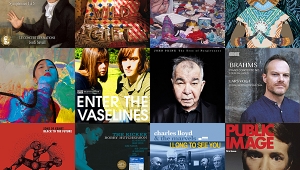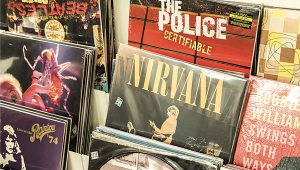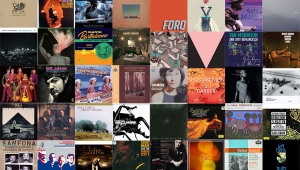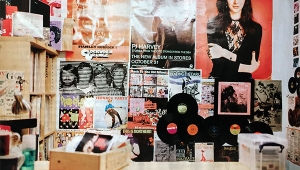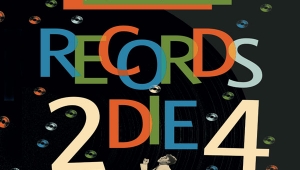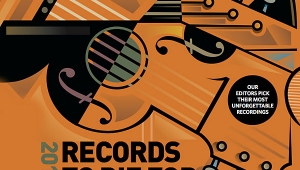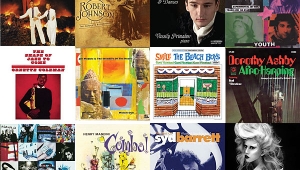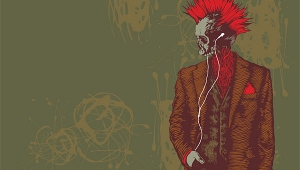| Columns Retired Columns & Blogs |
2002 Records To Die For Page 9
Leland Rucker
CREAM: Disraeli Gears
PolyGram 531 811-2 (CD). 1967/1998. Felix Pappalardi, prod.; Tom Dowd, eng. AAD. TT: 33:33
Strange brew. The rainbow has a beard. Tales of brave Ulysses. Whimsical wah-wah. Delirious drums. Big bass. Harmonies from some higher dimension. SWLABR. There is little doubt that Cream's short career sowed the seeds for future musical prowess and excess while wedding the blues to psychedelia, but there's no excess here. Disraeli Gears is about economy, stupid. These 11 songs are notoriously lean and mean, the longest, "Sunshine of Your Love," clocking in at little more than four minutes. Along with Highway 61 Revisited, this is where rock finally pulled up alongside the blues, blew by, and waved back.
BLIND WILLIE JOHNSON: Dark was the Night
Columbia/Legacy CK 65516 (CD). 1928-1932/1998. Lawrence Cohn, prod. A-D. TT: 50:40
With lyrics ripped from Baptist hymnals and scripture, a mannered steel-guitar style, and a moaning, tortured voice that cried like a prophet in the wilderness, the street evangelist known as Blind Willie Johnson worked the crossroads between Saturday night and Sunday morning. This is as scary as religious music got in the 1920s or any other decade. Original versions of "If I Had My Way," "Dark is the Night," "John the Revelator," and 13 others you probably thought were written by someone else.
DUKE ELLINGTON/RAY BROWN: This One's for Blanton
Duke Ellington, piano; Ray Brown, bass
Pablo/Analogue Productions CAPJ015 (CD). 1972/1995. Norman Granz, prod.; Doug Sax, remastering; Chad Kassem, reissue prod. AAD. TT: 40:01
Just before Jimmy Blanton died in the summer of 1942 at a shockingly young age, he completely changed the status of the double bass with one simple idea: bass solos. He triumphed for two glorious years in Duke Ellington's band, and after that, the bass never looked back.
HAYDN: Piano Sonatas
Nos. 32 in g, Hob XVI:44; 33 in c, Hob XVI:20; 53 in C, Hob XVI:48; 54 in G, Hob XVI:40; 58 in D, Hob XVI:51; 59 in E-flat, Hob XVI:49; 60 in C, Hob XVI:50; 62 in E-flat, Hob XVI:52; Fantasia in C, Hob XVII:4
András Schiff, piano
Teldec 0630-1714-2 (2 CDs). 1998. prod.; Ulrich Ruscher, eng. DDD. TT: 2:27:30
While my tastes run to Alfred Brendel playing Haydn, I must pay tribute to András Schiff for this two-CD set. The sound, thanks to Teldec's 20/24-bit Mod recording technology, is first-rate in every way.
JOHN HIATT: Anthology
Hip-O 314 556 134-2 (2 CDs). 2001. John Hiatt, many others, prods.; Mike Ragogna, compilation prod.; various engs. AAD? TT: 2:35:29
For my money, Bob Dylan, Bruce Springsteen, Stevie Wonder, and John Hiatt are the most important American songwriters of the last 30 years. There's no better snapshot of Hiatt's brilliant career than this chronological 40-song collection spanning his years with Epic, MCA, Geffen, A&M, Capitol, and his new home, Vanguard. It's telling how fully formed Hiatt was at the beginning: 1974's "Sure As I'm Sittin' Here," a hit for Three Dog Night, opens the set, and from there it only gets better. This journey through Hiatt's past meanders through original versions of songs covered by a Who's Who: from Rosanne Cash, Kelly Willis, and Bonnie Raitt to Johnny Adams, B.B. King and Eric Clapton, and Dylan himself. But in almost every case, these originals are the best. With his edgy, nuanced-filled voice and phrasing, Hiatt articulates his lyrics, rich with humor and personal reflection, better than anyone.
HAL KETCHUM: Awaiting Redemption
Curb D2-77948 (CD). 1999. Stephen Bruton, prod.; Dan Bosworth, eng. AAD? TT: 49:53
Despite a respectable chart run in the early and mid-'90s, Hal Ketchum, with his folky sensibilities and soulful pipes (kind of a white Aaron Neville), never sounded like more than a distant cousin to the cowboys and hat acts who were the rage during those country-music boom years. But it is this underrated gem, recorded in 1996 and released three years later, that best reveals Ketchum's gifts as a singer and songwriter. From the Beatlesesque "You Love Me, Love Me Not" to the heartbreaking, melodically gorgeous "Lonely Old Me" closer, this 12-song set seamlessly marries the purity of traditional country with dollops of contemporary sophistication. Add guest appearances by Delbert McClinton, Anson Funderburgh, and producer Bruton, and you have a sublime, rootsy masterpiece from beginning to end. Ketchum & Co.'s original working title said it all: Hal Yes!
HAYDN: Symphonies 45 & 55
MOZART: Piano Concerto 12, K.414
Benjamin Britten, piano, conductor; Aldeburgh Festival Orchestra
Decca 458 869-2 (CD). 1957/2000. James Walker, prod. AAD. TT: 71:57
Though the recording market has been flooded in recent years by previously unissued live recordings of composer Benjamin Britten performing, as pianist and/or conductor, music by any number of composers at his Aldeburgh Festival, this disc contains material that came out in 1957 on LP and just happens to trump them all. Britten seems to have performed only music for which he felt a special rapport and advocacy; the Mozart concerto is a superb example, exuding spontaneity and a strong sense of ownership. At the time, one critic wrote, "He plays a Mozart concerto...not merely as if he had written it, but as if he had written it last night." Indeed. In the Concerto 12 here, that quality is manifested in Britten's highlighting of all manner of inner details (often in the violas) that show you how and why the piece works. Haydn's "Farewell" and "Schoolmaster" symphonies (Nos. 45 and 55) aren't great music, but the performances are greatly persuasive. The in-concert sound of all three works is clear, honest, and surprisingly undated. Though not officially released in the US, this and other discs in Decca's Britten at Aldeburgh series are widely available here as imports.
SIBELIUS: Symphony 5, Karelia Suite, Pohjola's Daughter, The Bard
Sakari Oramo, City of Birmingham Symphony Orchestra
Erato 8573-85822-2 (CD). 2001. Tim Oldham, prod.; Jean Chatauret, eng. DDD. TT: 66:27
The name sounds like an exotic drink but is, in fact, the man who's making Birmingham, England forget the departed Simon Rattle. Virtually unknown outside his native Finland, Sakari Oramo was leapt on fairly soon after the City of Birmingham Symphony Orchestra began its search to replace Rattle, and the results are being heard in a Sibelius cycle now being recording for Erato. Every bar exudes a great sense of freedom and personal relationship with the music, borne out of a deep understanding of it. Few recordings have climaxes that somehow build with flexibility and inexorability. There's momentousness in the piece's ebb and flow, tension and release, all amid light, ever-airborne rhythms. Also, the Erato engineers get a more radiant sound out of the CBSO's recording venue than EMI ever did for Rattle. There's a catch: This and Oramo's recording of Sibelius' Symphony 2 are presently available only in Europe, though you can find them on any number of British CD websites. No doubt the US releases are being delayed until Oramo makes some Stateside appearances and is more than just another unpronounceable Finnish name.
CREAM: Disraeli Gears
PolyGram 531 811-2 (CD). 1967/1998. Felix Pappalardi, prod.; Tom Dowd, eng. AAD. TT: 33:33
Strange brew. The rainbow has a beard. Tales of brave Ulysses. Whimsical wah-wah. Delirious drums. Big bass. Harmonies from some higher dimension. SWLABR. There is little doubt that Cream's short career sowed the seeds for future musical prowess and excess while wedding the blues to psychedelia, but there's no excess here. Disraeli Gears is about economy, stupid. These 11 songs are notoriously lean and mean, the longest, "Sunshine of Your Love," clocking in at little more than four minutes. Along with Highway 61 Revisited, this is where rock finally pulled up alongside the blues, blew by, and waved back.
BLIND WILLIE JOHNSON: Dark was the Night
Columbia/Legacy CK 65516 (CD). 1928-1932/1998. Lawrence Cohn, prod. A-D. TT: 50:40
With lyrics ripped from Baptist hymnals and scripture, a mannered steel-guitar style, and a moaning, tortured voice that cried like a prophet in the wilderness, the street evangelist known as Blind Willie Johnson worked the crossroads between Saturday night and Sunday morning. This is as scary as religious music got in the 1920s or any other decade. Original versions of "If I Had My Way," "Dark is the Night," "John the Revelator," and 13 others you probably thought were written by someone else.
![]()
Jonathan Scull
DUKE ELLINGTON/RAY BROWN: This One's for Blanton
Duke Ellington, piano; Ray Brown, bass
Pablo/Analogue Productions CAPJ015 (CD). 1972/1995. Norman Granz, prod.; Doug Sax, remastering; Chad Kassem, reissue prod. AAD. TT: 40:01
Just before Jimmy Blanton died in the summer of 1942 at a shockingly young age, he completely changed the status of the double bass with one simple idea: bass solos. He triumphed for two glorious years in Duke Ellington's band, and after that, the bass never looked back.
Later in that decade, another, barely older bassist hefted his axe to complete the revolution that young Blanton hadn't lived to enjoy, and the great Ray Brown established himself as the preeminent bassist of our time. Think what a lovely circle was closed on this album: the Duke playing along, each and every track a work of high art. Ellington's restrained, elegant style is a willing and low-key partner to Brown's stylings, showing in every sense why Brown's name is so revered in the jazz pantheon.
Filled with joy and deep into each other's heads, Ellington serves as Brown's perfect foil—it doesn't get better than this. The recording, originally a humble Pablo, is one of my all-time favorites that I will cherish till my dying day. Don't miss it—you'll be depriving yourself of one of the great 40 minutes of recorded history. My thanks to Chad Kassem, who remastered this wonderful recording with Doug Sax on all-tube electronics. (XVII-9)
HAYDN: Piano Sonatas
Nos. 32 in g, Hob XVI:44; 33 in c, Hob XVI:20; 53 in C, Hob XVI:48; 54 in G, Hob XVI:40; 58 in D, Hob XVI:51; 59 in E-flat, Hob XVI:49; 60 in C, Hob XVI:50; 62 in E-flat, Hob XVI:52; Fantasia in C, Hob XVII:4
András Schiff, piano
Teldec 0630-1714-2 (2 CDs). 1998. prod.; Ulrich Ruscher, eng. DDD. TT: 2:27:30
While my tastes run to Alfred Brendel playing Haydn, I must pay tribute to András Schiff for this two-CD set. The sound, thanks to Teldec's 20/24-bit Mod recording technology, is first-rate in every way.
From the booklet: "Haydn is, together with Schumann, probably the most neglected and misunderstood of the great composers." I couldn't agree more, at least as far as Haydn is concerned—to me, he's the epitome of masculine restraint, of beauty and sinew, of unvarnished elegance and melodic charm. Schiff does a wonderful job of communicating the rich legacy of the sonatas to contemporary listeners.
Any time a CD ends and I think to myself, "Hey, that CD can't be over," I know I've hit a good one. I've simply never gotten enough of these sonatas. They make me feel whole.
If you're in a spending mood, pick up Haydn's Complete Piano Trios by the Beaux Arts Trio (nine CDs, Philips 454 098-2). You won't be sorry with either choice.
![]()
David Sokol
JOHN HIATT: Anthology
Hip-O 314 556 134-2 (2 CDs). 2001. John Hiatt, many others, prods.; Mike Ragogna, compilation prod.; various engs. AAD? TT: 2:35:29
For my money, Bob Dylan, Bruce Springsteen, Stevie Wonder, and John Hiatt are the most important American songwriters of the last 30 years. There's no better snapshot of Hiatt's brilliant career than this chronological 40-song collection spanning his years with Epic, MCA, Geffen, A&M, Capitol, and his new home, Vanguard. It's telling how fully formed Hiatt was at the beginning: 1974's "Sure As I'm Sittin' Here," a hit for Three Dog Night, opens the set, and from there it only gets better. This journey through Hiatt's past meanders through original versions of songs covered by a Who's Who: from Rosanne Cash, Kelly Willis, and Bonnie Raitt to Johnny Adams, B.B. King and Eric Clapton, and Dylan himself. But in almost every case, these originals are the best. With his edgy, nuanced-filled voice and phrasing, Hiatt articulates his lyrics, rich with humor and personal reflection, better than anyone.
As enduring as these songs are, I love to recommend this collection for another reason that's close to my heart. For me, there's no better music for jacking up the sound system for my 35-minute WalkFit treadmill workout than tracks 3-12 of disc 2. The prospect of hearing these late-'80s/early-'90s nuggets, from "Tennessee Plates" through "Angel Eyes" (a top-five pop hit for the Jeff Healey Band), pumps me up every time. Thank you, John.
HAL KETCHUM: Awaiting Redemption
Curb D2-77948 (CD). 1999. Stephen Bruton, prod.; Dan Bosworth, eng. AAD? TT: 49:53
Despite a respectable chart run in the early and mid-'90s, Hal Ketchum, with his folky sensibilities and soulful pipes (kind of a white Aaron Neville), never sounded like more than a distant cousin to the cowboys and hat acts who were the rage during those country-music boom years. But it is this underrated gem, recorded in 1996 and released three years later, that best reveals Ketchum's gifts as a singer and songwriter. From the Beatlesesque "You Love Me, Love Me Not" to the heartbreaking, melodically gorgeous "Lonely Old Me" closer, this 12-song set seamlessly marries the purity of traditional country with dollops of contemporary sophistication. Add guest appearances by Delbert McClinton, Anson Funderburgh, and producer Bruton, and you have a sublime, rootsy masterpiece from beginning to end. Ketchum & Co.'s original working title said it all: Hal Yes!
![]()
David Patrick Stearns
HAYDN: Symphonies 45 & 55
MOZART: Piano Concerto 12, K.414
Benjamin Britten, piano, conductor; Aldeburgh Festival Orchestra
Decca 458 869-2 (CD). 1957/2000. James Walker, prod. AAD. TT: 71:57
Though the recording market has been flooded in recent years by previously unissued live recordings of composer Benjamin Britten performing, as pianist and/or conductor, music by any number of composers at his Aldeburgh Festival, this disc contains material that came out in 1957 on LP and just happens to trump them all. Britten seems to have performed only music for which he felt a special rapport and advocacy; the Mozart concerto is a superb example, exuding spontaneity and a strong sense of ownership. At the time, one critic wrote, "He plays a Mozart concerto...not merely as if he had written it, but as if he had written it last night." Indeed. In the Concerto 12 here, that quality is manifested in Britten's highlighting of all manner of inner details (often in the violas) that show you how and why the piece works. Haydn's "Farewell" and "Schoolmaster" symphonies (Nos. 45 and 55) aren't great music, but the performances are greatly persuasive. The in-concert sound of all three works is clear, honest, and surprisingly undated. Though not officially released in the US, this and other discs in Decca's Britten at Aldeburgh series are widely available here as imports.
SIBELIUS: Symphony 5, Karelia Suite, Pohjola's Daughter, The Bard
Sakari Oramo, City of Birmingham Symphony Orchestra
Erato 8573-85822-2 (CD). 2001. Tim Oldham, prod.; Jean Chatauret, eng. DDD. TT: 66:27
The name sounds like an exotic drink but is, in fact, the man who's making Birmingham, England forget the departed Simon Rattle. Virtually unknown outside his native Finland, Sakari Oramo was leapt on fairly soon after the City of Birmingham Symphony Orchestra began its search to replace Rattle, and the results are being heard in a Sibelius cycle now being recording for Erato. Every bar exudes a great sense of freedom and personal relationship with the music, borne out of a deep understanding of it. Few recordings have climaxes that somehow build with flexibility and inexorability. There's momentousness in the piece's ebb and flow, tension and release, all amid light, ever-airborne rhythms. Also, the Erato engineers get a more radiant sound out of the CBSO's recording venue than EMI ever did for Rattle. There's a catch: This and Oramo's recording of Sibelius' Symphony 2 are presently available only in Europe, though you can find them on any number of British CD websites. No doubt the US releases are being delayed until Oramo makes some Stateside appearances and is more than just another unpronounceable Finnish name.
- Log in or register to post comments

